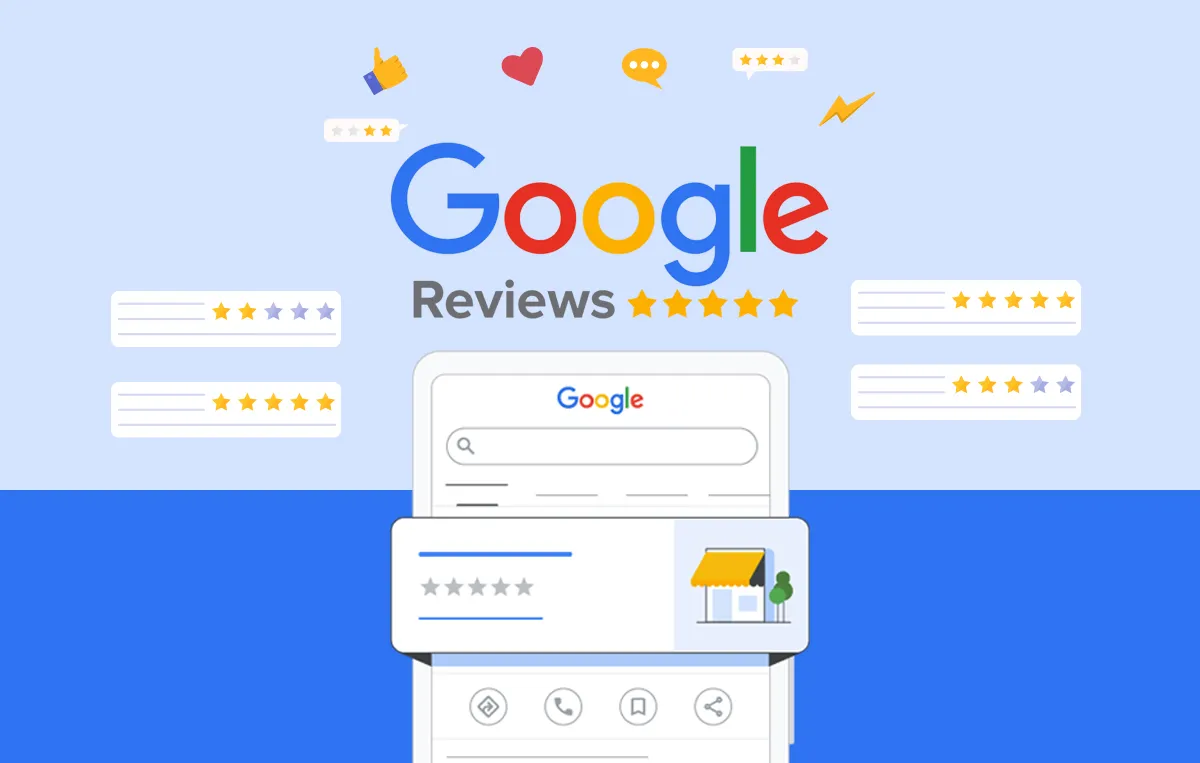If you are among the 93% of consumers, you probably check the reviews before investing in a product or going to a restaurant.
Online reviews are the new word of mouth that affects the purchase decisions of your target market consumers. Among many online review platforms, Google Reviews is a standout, attracting 73% of all online reviews.
Google Reviews appear right alongside your business listing on Google, persuading potential customers even before they visit your website. They are the digital equivalent of personal recommendations, carrying significant weight in a consumer’s decision-making process.
So, managing your reviews isn’t just a good idea; it’s a must.
In this blog, we will share best practices for managing Google Reviews, a crucial aspect of your online business reputation.
8 Best Practices for Google Review Management
Managing Google reviews can seem overwhelming, but with the right strategies, it can be straightforward and beneficial. By implementing these eight simple best practices, you can effectively monitor, respond to, and analyze your reviews, ultimately improving your online reputation and attracting more customers.
Let’s dive into how to manage your Google reviews:
1. Getting Your Google Business Profile Started
Google My Business (now Google Business Profile) is a free-of-cost platform by Google where you can create your business listing, helping you to stand out in local searches. Your GMB listing can help your consumers with an array of business information, such as:
- Business name
- Business profile
- Address and Phone number
- Business hours of operations
- Consumer reviews
- Images
- Question and answers
This information can help people in your local area find your business. Research shows that business owners who claim their Google My Business (GMB) profile gain significant advantages, such as boosting revenue and attracting more customers.
Here are eight simple steps that you can follow to set up your business listing on Google:
- Step 1: Open Google Business Profile Manager
- Step 2: Add Your Business to Your Account in Google Business Profile Manager
- Step 3: Request to Add an Existing Business
- Step 4: Add Your Business Name and Choose a Category
- Step 5: Choose Your Location
- Step 6: Add Your Contact Information
- Step 7: Choose Whether or Not to Receive Information From Google
- Step 8: Verify Your New Business Listing
2. Optimizing your Google Business Listing
Just having a Google business listing is not enough. Many businesses are not able to fully realize the potential of this platform. To get the most out of your Google business profile, you need to optimize it. By keeping your information up-to-date and accurate, you can improve your visibility in local search results, making it easier for potential customers to find you.
Here’s a step-by-step guide to optimizing your GBP listing to take charge of your local marketing:
- Step 1: Fill Out Key- Information
- Step 2: Get Your Listing Verified
- Step 3: Add Keywords
- Step 4: Specify Your Hours of Operation
- Step 5: Add Photos to Your Posts
- Step 6: Add Other Visuals
- Step 7: Choose the Right CTA
- Step 8: Add Q&A Section
A well-optimized profile with high-quality images, up-to-date contact details, and business hours enhances trust and credibility. Responding to reviews and engaging with customers also boosts your online reputation.
Additionally, optimizing your profile can lead to higher rankings in Google Maps, driving more foot traffic and inquiries, ultimately increasing your chances of attracting new cus
3. Standing Out in the Local Search
When you optimize the Google My Business (GMB) profile, it can boost your online visibility, helping you stand out in Google search results.
Once your Google business listing is optimized and live, your business has a great chance of landing in Google’s Local Pack also known as the “3-Pack”. 3-Pack is a set of top search results pulled from the GMB directory, giving your business top ranking placement.
These listings appear right at the top of the search page, complete with a local map and a handy “More Places” link to explore additional businesses in the area.
4. Make Profile Accessible
Once you have optimized your Google Business Profile, you must encourage your customers to leave reviews. But first, you need to make the process simple and easy for them. That’s where Google Review links come in.
Google review links are URLs that take your customers to your Google My Business profile. This makes it simple for your customers to leave feedback effortlessly.
By simply generating and sharing your Google review link, you can enhance the number of reviews, improve your search rankings, and grow your business.
There are four different ways through which you can get Google review links:
- Option 1: Conducting Google Search
- Option 2: Using Google Maps
- Option 3: Through Google Business Profile Manager
- Option 4: Through a Place ID Finder
Once you have the Google review link, you can share it with your customers through email, text, social media, or your website.
5. Ask for Reviews
We have already discussed how you can get your Google review link and how you can share it with your customers through email, text, website, or social media platforms. But there is more to asking for reviews. You can follow these ten easy practices to get more positive customer reviews:
- Win the customer with kindness
- Send email request
- Make it easy to access the review page
- Add a Google Review link on the app and website
- Embrace positive and negative reviews
- Use social media for Google reviews
- Create a “Leave Us a Review ” webpage
- Asking for Reviews One-on-One
- Incentivize
- Train and include your customer service team
The tips shared here are your go-to guide for answering the question, “How do I ask for Google reviews?” By following these strategies, you’ll significantly boost your chances of receiving more positive and impactful reviews on Google.
6. Respond to Reviews
Responding to positive and negative Google reviews is key to managing your online business reputation. When you respond to both kinds of reviews, it gives a perception of their feedback and care about their experience.
While you always aim for positive reviews, you can not avoid negative feedback. In fact, such negative reviews, in particular, are a golden opportunity. They give you a chance to identify your shortcomings, address issues, and potentially turn a dissatisfied customer into a happy one.
Plus, responding to reviews regularly helps your SEO. Google favors businesses that engage with customers, which means more visibility for you.
Every review is a chance to connect with customers and strengthen those relationships. By staying on top of your reviews, you’re boosting your reputation and helping your business grow.
7. Analyze Customer Feedback
In addition to impacting online reputation, feedback also provides valuable information about how customers feel about your products and services. By analyzing these reviews, you can better understand their expectations and make informed decisions.
Customer feedback can help you uncover trends, identify opportunities for new product features, and highlight areas for improvement.
Here are some essential tips that will help you analyze your Google reviews:
- Read your Review: This will help you to get an idea of how your consumer perceives your products and services.
- Categorize your Reviews: You can use tags to categorize your reviews and gain deeper insights into customer feedback on key topics like food quality, facility cleanliness, and sales executive behavior.
- Study your Competitors Reviews: Apart from your own reviews, it is crucial that you read the reviews that your competitors receive. It is likely that their customers also have the same expectations as yours. Therefore reviewing your competitors Google reviews will aid you in finding areas of improvement for your company in their comments.
8. Automate Google Review Management
If there is one thing that is enhancing the outcome of business processes is automation across domains. When it comes to marketing, about 25% of companies are extensively deploying automation to simplify their digital marketing operations including online review management.
Automation can also help you manage Google reviews by saving time and resources you’d rather invest elsewhere in your business. You can use different review management tools like SocialPilot Reviews, to automate your review collection and response.
SocialPilot Reviews enables you to manage multiple listings, including Google Reviews, from a single interface. Its extensive features include swift AI-powered review response, automated text and email-based review request campaigns and tracking, negative review management, and much more.
With SocialPilot Reviews, you can effortlessly automate your review management to enhance customer engagement, and maintain a stellar online reputation—all from one powerful platform.
Conclusion
Managing Google Reviews is essential for maintaining a strong online presence and building trust with potential customers. By following these best practices—setting up and optimizing your Google Business Profile, encouraging reviews, responding thoughtfully, and leveraging automation—you can effectively manage your reviews, improve your reputation, and attract more customers.
Tools like SocialPilot Reviews can further simplify the process, allowing you to focus on other areas of your business while maintaining a positive online reputation.



